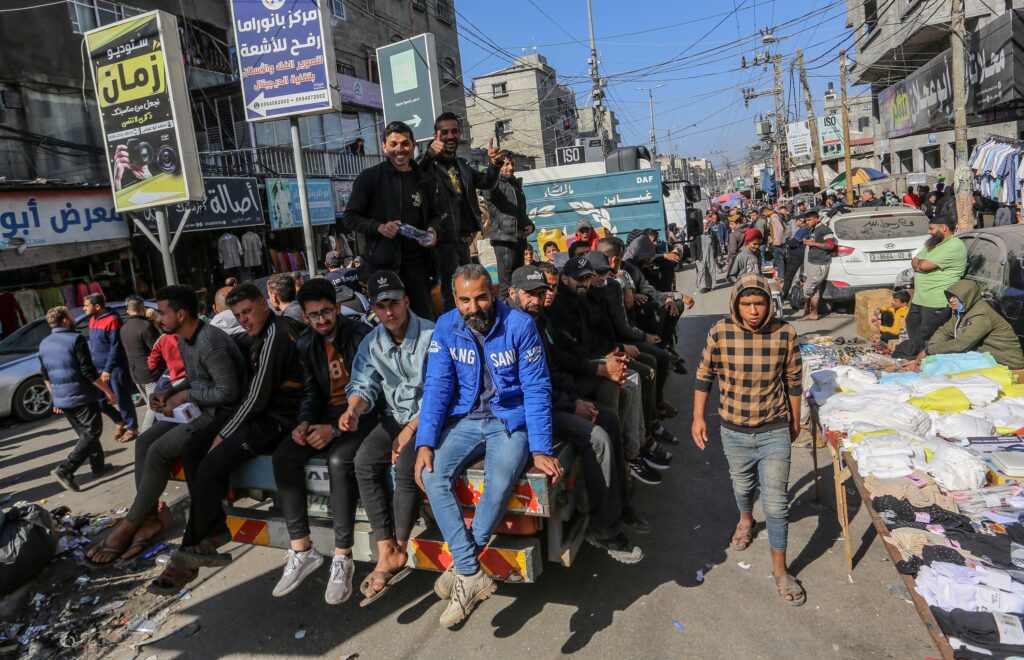FRESH AIR
Palestinians, “armed action” and the impact of the Gaza war
October 30, 2025 | Bren Carlill

The Hamas-Israel war appears to be convincing Palestinians that negotiations are more effective at achieving Palestinian objectives than violence.
The Palestinian Center for Policy and Survey Research (PCPSR) has been conducting surveys in Gaza and the West Bank for decades. The most recent survey was released on October 28.
One of the questions the PCPSR regularly asks is whether Palestinians think “armed action”, negotiations or “peaceful popular resistance” is the best or most effective means to achieve a Palestinian state.
We had a look at the responses to this question since the beginning of 2014. Violence is clearly preferred, with an average preference of 43%, compared to negotiations (28%) and peaceful resistance (22%).
As the graph shows, violence was seen as a better alternative to negotiations for almost the entire period, but this view was dramatically magnified after the Hamas mass terror attacks of October 7, 2023 – up to a high of more than 60% in early 2024. That spike is only now declining to pre-war levels.
We can also see that, since March 2024, the view that negotiations are better than violence has been trending upwards.
Yet when we broke this down into Gazan and West Bank respondents, something interesting appeared.
From September 2024, more people in Gaza have considered negotiations, rather than violence, as the best means for the establishment of a Palestinian state – for the first time in at least 11 years. This is likely because the “armed action” that Gazans had so long thought was best had, combined with Hamas’ illegal tactics of hiding amongst and under civilians, ultimately wrought the destruction we see today in Gaza.
In short, facing the consequences of “armed action”, Gazans now think negotiations are a better means of achieving statehood.
The survey released yesterday saw a tightening of opinion – we will monitor this closely. But it is still good news that, for the last 13 months, more Gazans think negotiations are the best means to achieve statehood rather than armed action. This is a historical precedent.
Sadly, West Bank Palestinians are taking much longer to realise that negotiations are better than violence, but there are encouraging signs that they too are coming to this understanding.
The feeling that violence is better than negotiations remains stubbornly high in the West Bank. The PCSPR survey released on October 28 shows that a majority of Palestinians still think that Hamas was right to attack Israel on October 7. Still, slowly, we can see a distinct trend that negotiations are increasingly seen as the best means for achieving a Palestinian state, and, just as painfully slowly, appreciation for violence is depreciating.
The differences between Gazans and West Bank Palestinians are likely because Gazans are facing the consequences of the October 7 attacks and their aftermath, whereas West Bank Palestinians are largely spared. Still, we would hope the trend continues, and a majority of Palestinians come to realise that violence is not the best tactic, but actually the worst. Peace with Israel would likely follow shortly after.
AIJAC is preparing a major report on Palestinian opinion to provide Australian and other policy makers detailed information on what Palestinians want to achieve vis-à-vis the Israeli-Palestinian dispute, how they want to achieve it, and what they want their state to look like. We will let you know when it is published.
Tags: Gaza, Israel, Palestinians, West Bank
RELATED ARTICLES

US Middle East strategy amid regional instability: Dana Stroul at the Sydney Institute






















